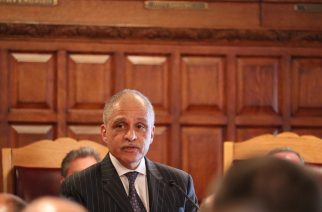
Representatives from the New York Association of Psychiatric Rehabilitation Services (NYAPRS) joined with more than 100 direct care staff and mental health advocates to rally on the steps of the Capitol last Wednesday to call on lawmakers to increase funding for mental health recovery assisted living programs.
Cries of “fair housing, fair wages!” rang out in West Capitol Park as demonstrators waved hand-painted signs. “Housing = Health,” proclaimed one. “My recovery starts with housing!” read another.
In his 2017-2018 budget proposal, Governor Andrew Cuomo allocated $10 million in state funding toward mental health housing programs. Advocates say it isn’t enough.
“$10 million over a diverse group like this doesn’t go very far,” said Harvey Rosenthal, executive director of NYAPRS. The group is seeking $28 million in additional funds for the year, with hopes of attaining $120 million over the next few years.
The additional funding would provide salary increases for direct care workers and those who staff the housing programs.
In recent years, the salaries for direct care workers have struggled to compete with other industries and professions.
“Everybody says this now, you can make more money at McDonald’s than you can working to help folks in recovery,” said Rosenthal.
According to Rosenthal, housing programs in New York are down nearly one-third of their staff in the past ten years. Of the two-thirds remaining, many have taken on second jobs to make ends meet, and more still are asked to cover additional shifts to make up for the staffing shortage.
“Staff turnover at state-funded mental health housing programs has reached such unprecedented levels that New Yorkers with psychiatric disabilities can no longer rely on the stability of relationships that are central to their recovery,” said Rosenthal, who has been working in the industry for 40 years. “Stable relationships that are based on trust, hope and compassion are essential to promoting wellness, recovery and independence, especially for those who are struggling to find their way through the very challenging process of early recovery.”
Brian Hollander, co-president of NYAPRS, paints recovery in broad strokes, and says quality direct care givers can help their clients in many ways, whether they are recovering from substance abuse, a physical injury, suffering an emotional trauma or contending with long-term disability.
“Recovery is defined as the path to putting your life back together, so that you can live the life that you want to,” he said. “It’s the ability to maintain a home, employment, to be able to maintain one’s own independent living.”
Of the 33,000 state-sponsored residential units ─ beds in care facilities or apartments with support staff ─ 35 percent remain vacant, according to NYAPRS.
Those pursuing recovery in state-sponsored facilities are often relegated to waiting lists, not because there are no beds available, but because there are not enough employees to staff the facilities.

Because of the staffing shortages, Rosenthal added, many of those left out of residential facilities end up in jails, hospitals, or on the street.
“People in early recovery need to progress as they progress. If somebody is more able to live independently, they need to be able to do that. People regress in their recovery because they’re stuck,” said Hollander. “They’re trying to put their life back together, and they’re not able to do that simply because there’s not a housing situation available for them or because that housing situation is not staffed.”
Rosenthal called it a wise investment up front for taxpayers to fund the housing staff and resources for New Yorkers in recovery.
“This kind of investment saves money and it saves lives,” he said.
Video produced by Daniel Wells









